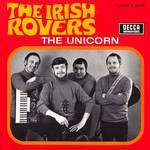The Unicorn (song)
| "The Unicorn" | |
|---|---|
 Cover to the UK single release | |
| Single by The Irish Rovers | |
| from the album The Unicorn | |
| Released | 1968 |
| Genre | Folk |
| Label | Decca Records |
| Writer(s) | Shel Silverstein |
| Producer(s) | Charles "Bud" Dant |
| "The Unicorn" | |
|---|---|
| Song by Shel Silverstein from the album Inside Folk Songs | |
| Released | 1962 |
| Genre | Folk |
| Label | Atlantic Records |
| Writer(s) | Shel Silverstein |
| Producer(s) | Jerry Wexler, Al Brackman |
The Unicorn is a song by Shel Silverstein that has been made very popular by Canadian band The Irish Rovers in 1968. It remains one of the best-known songs of the Irish Rovers' long career. It sold 8 million copies worldwide and reached #2 in the US Adult Contemporary Charts, #7 in the U.S. Hot 100,[1] and #5 in Ireland.[2][3] It can still be heard regularly in Irish Pubs. The lyrics to the song are also printed as a poem in Silverstein's book Where the Sidewalk Ends. In the original version of the song, The Irish Rovers speak half of the lyrics, as well as the part of the 4th Chorus. The final line of the 5th verse is spoken freely without the music: "And that's why you'll never see a Unicorn to this very day". On the remakes. the majority of the song is sung, again except for the final line, which is also spoken freely, without the music.
Shel Silverstein's own version was released in 1962 on his album Inside Folk Songs (Atlantic 8072).[4] His songbook, "Dirty Feet" (TRO/Hollis Music, 1969), includes a discography saying that, along with The Irish Rovers and Silverstein's versions, "The Unicorn" had been recorded by Bill Anderson (Decca), Shay Duffin (RCA), Robert Goulet (Columbia), Bob Turner[5] (ABC), and "Uncle Bill" (Dot). (The record "Uncle Bill Socks It To Ya"[6] was by Burt Wilson, imitating W.C. Fields)
Will Millar of The Irish Rovers recorded another, earlier version of the song with the St. Michaels Kids.[7] In 1981 Millar opened an Irish pub in Toronto under the name The Unicorn.[8] Sister pubs were also opened, including one at the site of Expo 86 where the Irish Rovers recorded a live version of the song.
In 1968 the song was covered by Irish trio The Bachelors.[9] Also in 1968, a French version, La Licorne, was recorded by Les Compagnons de la Chanson, and a German version, Bunte Papagaien und ein grünes Krokodil, was recorded by Andy Fisher.
In 1986, the song was covered by the Kidsongs Kids in their Kidsongs video "Good Night, Sleep Tight" and the sad part was left out.
Description
The song tells that unicorns were not a myth, but a creature that literally missed the boat, not boarding the Ark in time to be saved from the Great Flood described in the Bible. They are said to be the loveliest of all animals but also silly.[10]
Addendum
Andrew McKee later wrote new lyrics explaining that unicorns were magical creatures, and as the Great Flood was in progress, they grew wings and acquired the power to fly above the waters. He concluded the rewritten refrain by writing that to find them, one should seek out, in James M. Barrie's words from Peter Pan that explained how to reach Never-Never Land, "the second star to the right and straight on until morning."
References
- ↑ "The Unicorn, The Irish Rovers". Billboard, 1968. Retrieved 7 May 2012.
- ↑ "CANOE - JAM! Music - Pop Encyclopedia - Irish Rovers, The". Jam.canoe.ca. Retrieved 2016-10-02.
- ↑ "The Irish Charts: All There Is To Know: Irish Rovers". Irish Recorded Music Association. Retrieved 28 April 2012.
- ↑ "Shel Silverstein Discography". Dmdb.org. Retrieved 2016-10-02.
- ↑ "Bands, Singers, Songwriters / Composers, Soloists, Performers, Entertainers, Musicians, M.C.s (EmCees) - Bob Turner". AcousticByLines. Retrieved 2016-10-02.
- ↑
- ↑
- ↑
- ↑ "The Bachelors: The Unicorn". Discogs. Retrieved 28 April 2012.
- ↑ "The Unicorn Poem by Shel Silverstein - Poem Hunter". PoemHunter.com. 7 April 2010.